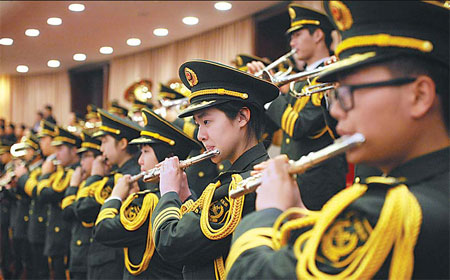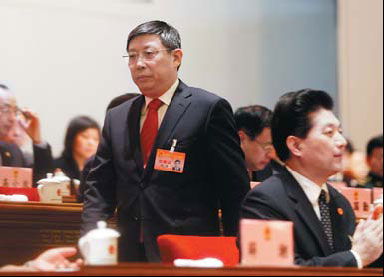Shanghai to lure multinationals
Updated: 2013-01-28 07:50
By Yu Ran in Shanghai (China Daily)
|
||||||||

|
A PLA brass band performs at the opening of the first session of the 14th Shanghai Municipal People's Congress on Sunday. The city is expected to attract another 150 regional headquarters of foreign multinational corporations by 2020, 37 percent more than the current 403. Cao Lei / for China Daily |
|
Yang Xiong (left), acting mayor of Shanghai, made a speech at the first session of the 14th Shanghai Municipal People's Congress on Sunday. Tang Yanjun / China News Service |
'Four Centers' plan to confirm status as international city and regional hub
Shanghai is expected to attract 150 more foreign multinationals' regional headquarters by 2020 - in addition to the 403 today - as it also works to nurture more domestic multinationals, Acting Mayor Yang Xiong said in the Report on the Work of the Government at the first session of the 14th Shanghai Municipal People's Congress on Sunday.
Transforming the city into the international economic, financial, trading and shipping centers ("Four Centers") has been the focal point of Shanghai's 12th Five-Year Plan as it pursues innovation-driven economic transformation.
Yang pointed out "openness represents Shanghai's biggest advantage" in moving the international goal forward.
The city's major objectives for the next five years are to become a world-renowned base for service trade and a major import-export hub.
"The report turned out to be more practical and pragmatic compared with previous years by having fewer overly detailed targets, but more attainable tasks with examples to make sure the city has the potential to achieve them," said Li Xunlei, a deputy to the Shanghai People's Congress and deputy CEO and chief economist of Haitong Securities Co Ltd in Shanghai.
"The city is opening up to welcome more foreign investors to advance the economic development of Shanghai and quickly turn it into a global trading center," said Huang Renwei, a deputy to the Shanghai People's Congress and vice-president of the Shanghai Academy of Social Sciences.
Trade in services will account for about 25 percent of the city's total imports and exports, compared with 22.1 percent in 2010, and greater emphasis will be placed on helping domestic businesses to build up their ability to withstand international economic risks and managing their international operations with a view toward nurturing world-class indigenous multinationals.
"The global economy is warming up gradually with obvious recovery, and this will be a good opportunity for Shanghai to attract more high-end overseas enterprises to bring their offices to the city and boost Shanghai's economy," Huang said.
Modern shipping services will be significantly improved, and the city will acquire all the core functions of an international trade center, with total merchandise sales amounting to 10 trillion yuan ($1.6 trillion).
"It will be a challenging restructuring process in the next five years to reach the goal of doubling the 2010 GDP and per capita income by 2020, but it looks promising that we will achieve this through the detailed tasks listed in the report," Huang said.
The modern service sector, one of the city's focal points, will be boosted vigorously with the development of financial markets and products by attracting more corporate headquarters and departments of financial institutions.
"Customer service in Shanghai is still not as good as in international cities like New York, London and Paris, and it will take time for the city to improve its service sector along with its economic development," said Liu Xiaobing, a professor at the School of Public Economics and Administration at Shanghai University of Finance and Economics.
yuran@chinadaily.com.cn
(China Daily 01/28/2013 page3)

 In Photos: 7.0-magnitude quake hits Sichuan
In Photos: 7.0-magnitude quake hits Sichuan
 Li Na on Time cover, makes influential 100 list
Li Na on Time cover, makes influential 100 list
 FBI releases photos of 2 Boston bombings suspects
FBI releases photos of 2 Boston bombings suspects
 World's wackiest hairstyles
World's wackiest hairstyles
 Sandstorms strike Northwest China
Sandstorms strike Northwest China
 Never-seen photos of Madonna on display
Never-seen photos of Madonna on display
 H7N9 outbreak linked to waterfowl migration
H7N9 outbreak linked to waterfowl migration
 Dozens feared dead in Texas plant blast
Dozens feared dead in Texas plant blast
Most Viewed
Editor's Picks

|

|

|

|

|

|
Today's Top News
Live report: 7.0-magnitude quake hits Sichuan, heavy casualties feared
Boston suspect cornered on boat
Cross-talk artist helps to spread the word
'Green' awareness levels drop in Beijing
Palace Museum spruces up
First couple on Time's list of most influential
H7N9 flu transmission studied
Trading channels 'need to broaden'
US Weekly

|

|









